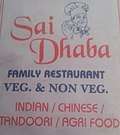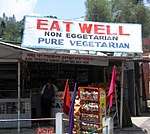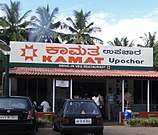Non-vegetarian
Non-vegetarian (non-veg) is an Indian English word that is used to refer to meaty food and also to a person who is a meatarian not a vegetarian i.e. someone who consumes meat, especially as a major source of protein.[1][2] Although the intended meaning is readily understood, these terms are not common parlance in the Anglosphere (English-speaking countries) where meat consumption is the norm, vegetarianism is a rarity, and veganism is a novelty.
| Look up nonvegetarian in Wiktionary, the free dictionary. |
A related word is eggetarian, that refers to a vegetarian who consume egg-based products but not meat.
In popular usage
- In India, it is mandatory that packaged food products be marked with Vegetarian and non-vegetarian marks, which are green and reddish-brown symbols that clearly indicate whether they are suitable for vegetarians or non-vegetarians respectively.

In India, labeling of packaged food products is mandatory to distinguish between non-vegetarian (reddish-brown) and vegetarian (green) products
- In India and Pakistan, non-vegetarian cuisine has been heavily influenced by the coastal, trading as well as immigrant cultures including Arabic, Turkic, Mughal, Persian as well as Portuguese, French and British leading to various indigenous forms of cuisine such as Mughlai, Hyderabadi, Awadhi, Kolhapuri, Malvani, Chettinad and Malabari. [3][4].While coming to non-veg, chettinad restaurants plays an important role[5]
- In India, most restaurants serving meat publicly and explicitly display the title 'non-vegetarian restaurant' or 'non-vegetarian hotel' (In India, the term hotel may colloquially refer to a restaurant or a hotel). This practice is intended to help strict, orthodox vegetarians who may want to avoid eating in such restaurants due to religious reasons or due to consciousness of the pain and sufferings that are inflicted on animals.[6][7] In his autobiography, Mahatma Gandhi had mentioned an incident regarding his dilemma, as a vegetarian, whether it is appropriate to eat a vegetarian meal in a non-vegetarian[8] restaurant or not.[9]



Name boards of non-vegetarian and vegetarian restaurants across India
gollark: Pick the first one.
gollark: Huh. I would have thought you would complain about it being complicated.
gollark: https://xkcd.com/970/Here's an image of it in use.
gollark: Ridiculous. It uses a PHP/COBOL/JS hybrid.
gollark: You type them into the missile launch web UI and it checks if they match.
References
- Cohesion. Nehru Institute of National Integration. 1970.
- Staff, Institute Of Naturopathy; (Bangalore), Institute of Naturopathy and Yogic Sciences (2002-12-01). Nutrition And Health: The Vegetarian Way. Sterling Publishers Pvt. Ltd. ISBN 9788120724242.
- Collingham, Lizzie (2006-02-06). Curry: A Tale of Cooks and Conquerors. Oxford University Press. ISBN 9780199883813.
- Mehendale, Āditya (2015). Rare Gems: A Non-vegetarian Gourmet Collection from Maharashtra. Om Books International. ISBN 9789384625214.
- "Anjappar Restaurants - Global Ambassadors of Chettinad Cuisine". www.anjappar.com. Retrieved 2018-03-23.
- Ratheiser, Daniel (2010-12-01). Work in India a Guide by Knowledge Must: A Complete Guide Book for Everybody Who Is Interested Working in India. Knowledge Must. ISBN 9781456354299.
- Brien, Charmaine O' (2013-12-15). The Penguin Food Guide to India. Penguin UK. ISBN 9789351185758.
- "Non-vegetarian Recipe Website". www.non-vegetarian.com. Retrieved 2020-02-27.
- Gandhi, M. K. (2009-01-01). An Autobiography: The Story of My Experiments With Truth. The Floating Press. ISBN 9781775414056.
This article is issued from Wikipedia. The text is licensed under Creative Commons - Attribution - Sharealike. Additional terms may apply for the media files.